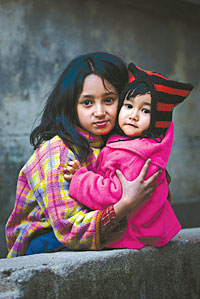 SAM KANG LI |
As a child, Audrey Hepburn suffered from hunger and malnutrition. She was traumatised by war, and abandoned by her father. She suffered from anemia and whooping cough, and had a near death experience when she was six weeks old. As an adult, she had three painful miscarriages, just like so many mothers today in developing countries.
Deep inside, Audrey Hepburn was sad: sad about the plight of children in the world, which she could empathise with having experienced a traumatic childhood herself.
Perhaps because I came from a small village in the mountains of Nepal, where there was no road, no school, no post office, no radio or television, no telephone, where illiteracy was near universal, and modern health service was non-existent, and I was myself a malnourished child, and I too had a near death experience, I feel a special connection with Audrey.
Jim Grant, my former boss at UNICEF, used to say that there has been more progress for children in the last 50 years than perhaps in the previous 500 years. Consider these examples:
• Twenty million children used to die in the world annually in the 1960s. Although world population has doubled since then, the number of child deaths has been halved to less than 10 million per year.
• In Nepal the child death rate has been reduced by half in the last decade in spite of a war.
• Smallpox used to kill 5 million people a year, it has now been completely eradicated. Polio which used to cripple millions is on the brink of eradication.
• There are more children in school today than ever before, and gender disparity is rapidly declining at the primary school level.
• Over a billion people have been lifted out of poverty in Asia alone in the past half century.
• Overall, children and their rights are much higher on the world's political agenda.
But much of this progress has bypassed the bottom billion people in the world, especially in sub-Saharan Africa and parts of South Asia. The recent dramatic rise in food and petroleum prices is bound to further impoverish the already poor, and as usual, children are likely to be its main victims.
Because children bear the heaviest burden of poverty, all efforts to combat poverty must give the highest priority to children. The damage caused by malnutrition, infection and poor childcare in early childhood often lasts for an entire lifetime, and cannot be easily reversed later.
Now, some say that poverty has always been with us, and it will never be completely eliminated. That maybe true in the case of relative poverty, but we simply cannot and should not accept the indignity of absolute poverty as the unavoidable fate of humanity in this world of incredible wealth and prosperity.
At this time of unprecedented global prosperity, in which someone new becomes a billionaire every second day, nearly 1 billion people live on less than $1 a day, 800 million people go to bed hungry every night, and 1 billion people without access to clean drinking water. We now have a global plan of action to fight poverty in the form of the Millennium Development Goals. It will take massive efforts by developing countries to achieve, and needs an additional investment of about $50 billion a year in external aid.
That isn't a lot of money considering taxpayers in US, Europe and Japan pay $1 billion per day in farm subsidies to protect their farmers against (guess what?) competition from poor farmers in developing countries. It is not that the world does not have enough resources to fight child poverty, it is more likely that world leaders and us citizens do not give enough priority to combating such poverty.
Children of the world need peace as much as they need food and water, health and education, love and a caring touch. So much of the poverty, injustice and even the consequences of natural disasters that haunt children are really man-made tragedies, for which there is only one man-made solution: peace.
Based on a speech at the ceremony in Atlanta last week in which Kul Chandra Gautam was conferred the 2008 Audrey Hepburn Humanitarian Award. Gautam is the former Assistant Secretary-General of the United Nations and Deputy Executive Director of UNICEF.



